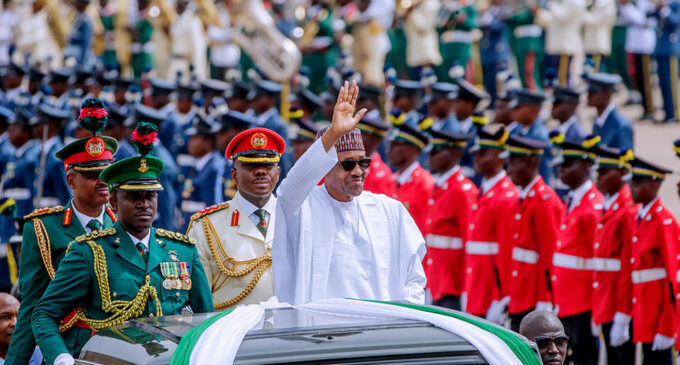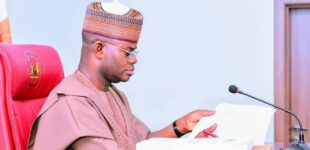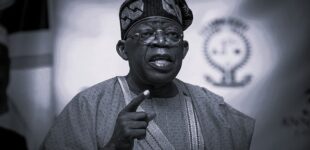We must nurture this democracy to flourish in Nigeria

BY KAYODE ADEBIYI
A lot of things that happened over the years informed my present disposition to governance in Nigeria. The military government was the in-thing while I was growing up. I once contemplated attending the Nigerian Defence Academy because I believe that would pave the way for me to become a military governor. I was part of those who hailed the military when they truncated the 2nd Republic immediately after Shehu Shagari’s election for his second term in office. It was that coup that brought Muhammadu Buhari to power as a military head of state.
With benefit of hindsight, we did not know we short-changed ourselves by hailing the military into power. I think one of our major issues in Nigeria is our impatience to see Nigeria grow and develop organically to rank amongst the great nations of the world. There is nothing wrong with believing that one’s nation can rank amongst the best around the world. Nothing is wrong with that kind of aspiration. But it takes time and a good deal of reorientation is needed under a democratic setting for such to be achieved, especially having been under military dictatorship for a long time.
Nine years after a bloody civil war that was followed by a long, unbroken military rule hallmarked by the assassination of a sitting head of state, the military government under Olusegun Obasanjo finally handed over to a democratically elected government in 1979. With all that had happened, it would appear unrealistic to have expected the Shagari administration to pull off the stunt of taking the nation to Eldorado within the few years it was allowed to last. How do we think those who succeeded in the military would have suddenly detoxed themselves from the military mentality to which every Nigerian had been subjected since the 60s? In fact, most of the politicians of that era served under all the military regimes. Why we are then surprised that corruption, parochialism, and undemocratic traits would have suddenly evaporated from the 2nd Republic?
The fact remains that there was nothing the 2nd Republic politicians did that was as bad as the worst atrocities of the military boys, both before and after the overthrow of the Shagari government. Instead of rejecting the return of the military just less than five years after they handed over, we all ran out onto the streets hailing the military boys for truncating a democratically elected government. Even if the election was not perfect, we were learning a civil and democratic way of choosing our elected representatives. You cannot get a perfect system in a jiffy. That has always been our undoing as a people. If it does not happen now, throw it away! That attitude brought us to where we are today, and I pray we learn through our obvious bad choices of the past.
Imagine the Shagari government had been allowed to last its term with all its fault and shortcomings, by 1987, power would have shifted down south, and perhaps we would not be where we are today. Democracy is not an end but a means to an end. It is not a 100-meter dash but a marathon. The only way to learn, build and improve on it is by constant practise, improvement, constitutional maturity, learning and relearning of democratic culture and ethos. We never allowed democracy to grow a tap root in Nigeria because of our impatience, erratic and unnecessary comparison of the state of our development with some developed western nations like the UK and the USA. We always forget that Rome was never built in a day. These nations also have their history of slumber, jump-start, war and infractions and multiple constitutional overhauls, breakups of agreements and signing of treaties until they had a semblance of balance that propelled their development. All these took years, hundreds of years.
Of course, people can ask, are you suggesting we must spend 100 years to get it right? No! That is not the point. In as much as the modern era and civilisation have helped to bridge the gap of time and effectiveness of governance, the fact remains that moving from underdevelopment to development of a nation under a democratic system of government with its attendant checks and balances must take a natural cause of evolution, especially for a nation like Nigeria that has decided to embrace democracy as a form of government, which to me is the slowest form of government for a nation in a hurry to develop. The late prime minister of Singapore, Lee Kuan Yew spent over 35 years under a quasi-democratic government to lift Singapore that was a slum in the 60s to a modern, prosperous nation by the 90s. That is for a nation that was governed by one man for almost 40 years buoyed by the effect of continuity in governance, making mistakes and learning from it with a tough stance and uncompromising position against corruption, indolence, and non-tolerance for what we today call “opposition” to slow down the work of government.
Since we have decided to adopt democracy as a form of government, we must develop the spirit of accommodating a slow-paced approach to policy formulation, implementation, and development in general. We must realise the only way to change a government is via the ballot box every four years and not through brigandage and revolution just because a government is not meeting the expectation of a segment of the society. In a democracy, what must be done is to rally like-minded people and organise them to vote a government in or out of office. It is called participatory democracy! Nigeria is still a baby democratic nation, and we still have a long way to go. I hope we will not truncate this experiment on the altar of wokeness and impatience.
It is important for the Nigerian educated elite to be the champion of the democratic ideals we have embraced and take time to always educate others that achieving nationhood is not a walk in the park, but a tortuous journey that comes with a load of challenges, failures, and successes in equal measures. We would never get a saint as a leader and no leader now or in the nearest future is coming to perform magic and fix all the problems we often project over and above the little baby steps of success we take. US, UK, Germany, or other western nations did not become great overnight!
The United States, for instance, has had a long road to travel to some measure of equity for its people. Key people throughout their history have been influential in making this happen. After America’s independence was finally won in 1776, the founding fathers set to work setting up a government, unlike the one they had just broken away from in England. Of course, they wanted to do away with the monarchy of the old world, and replace it with a representative government in which the people had a say. The founding fathers came up with a three-branch system of government that is co-equal and that would stand as a check and balance on each other. They did not want any of the three branches to be more powerful than the other. This new working arrangement had its own teething problems.
While documents such as the Declaration of Independence and the United States constitution discussed equality, freedom and justice for all, the founding fathers were only mouthing it. Only white men had the power to vote and become part of the government, and even that was limited to wealthy, educated, protestant men. Slaves were not even considered people, let alone citizens. Many women, even white women often felt like slaves, as well; though they had citizenship, they had no legal rights of their own, and could not vote. This is the genesis of democratic practice in the US. It took many years and a lot of willingness from the people to dig in and stand for democracy despite all challenges. The same democracy that only allowed few with wealth and education to participate in governance is the same that later promised, if not delivered, equal rights for people of all genders, religions, races, and colour. And even till now, the USA is still struggling with the issue of inequality amongst race and colour despite all they have achieved. In fact, development and modernisation would always throw up new challenges to the status quo, ideas, and new levels of inequality to fight and negotiate away. This goes a long way to show that the democratic journey is an unending one as long as the focus is on improving the life of a people.
It was women like Elizabeth Cady Stanton in the 1840s that began organising women who wanted more than they were allowed, and this organisation was what led to the right to pursue formal education and voting right for women. The number one right these women wanted was the right to vote, and these women became known as suffragists. This was what led to the popular Seneca Falls Convention, held in Seneca Falls, New York. The most important document to come out of the convention was The Declaration of Sentiments. It was also this convention that questioned the integrity of the declaration of independence and led to the Declaration of Sentiments which outlined the purpose of that convention: ”That all men and women are created equal…” It took 64 years for women to secure the right to vote between the US declaration of Independence and agitation by women led by Stanton.
What am I driving at here? There would always be deficiencies and shortcomings in governance. What we cannot do is call for its destruction. People need to come to an understanding that to grow a nation under democracy, people must learn to organise within the ambits of democratic tenets with like-minded individuals to cause a change from within to improve our union. That is how nations evolve and develop the capacity to meet the aspirations of a greater number of people. What democracy cannot do and would not do is to satisfy the agitations and yearnings of everybody. But it has the capacity to meet the aspiration of the greater majority at every point in time.
Francis Newton Thorpe, professor of American Constitutional History at the University of Pennsylvania 1885-1898 said: “The evolution of man is the hope of the state.” He believed in the evolution of democracy in America where two large processes were to be worked out – the utilization of the resources of nature, and the organization of civil affairs by means of a government adapted to such a country as ours. The industrial process has been coordinated with the civil populace, and democracy in America is the result. In order words, the civil populace by organising themselves within a democratic framework has the capacity over time to achieve great things for their nation. What we have not been able to do in Nigeria is for leaders and educated elite to organise and have consensus truthfully. Rather, many stay on the fringes to throw stones at those who have the courage to participate. There can be no vacuum in nature.
Democracy in America is the outcome of Roman, Celtic, and Teutonic ideas. It is a civil composite. Its evolution is recorded in a series of political adjustments. Political adjustment is the administration of government. It is that of which Franklin frequently speaks to. It is a practical affair. It is the other half of the apple of civil discord, as the theory of the state was for ages the first half. According to Thorpe, “Democracy in America is but slightly original. It was latent in European life long before the colonization of America. But the adjustment of local and general interests in the state has developed before our eyes in this country, and therefore it seems new and peculiarly our own. So, the fruit on the tree is the farmers, the flower on the bush, the gardeners. Each wrought in sincerity; but the seed was before flower or fruit”.
Nigerians as Thorpe enunciated need to start to see democracy as an act of exploring the past as great a distance as it has anticipated the future. We must set in order the genesis of our civil institutions, by all of us resolving to see ourselves heirs-in-law. We must learn from the past and apply the lessons while working in the present, and towards the future. The style of the tool might change, but sunshine and rain and earth are, and weeds grow despite botany. But the apple on the tree is larger, fairer, and pleasanter to the taste than the wild apple; the flower on the stalk is the history of generations of gardeners. Flower and fruit come from fruit and flower, and the changes during that time register an evolution hastened by intelligent culture. We must learn to culture this democracy like a gardener. It’s all we have left to develop and evolve into a developed and egalitarian society. Yes, prune we must, but we must not throw the whole plant into the furnace of no return.
Democracy is not so direct and simple as dictatorship or monarchy. If democracy is indeed what we toiled and some died to bequeath to us, then we owe the dead a determination to see it succeed no matter how slow it might be. Montesquieu said that “in a democracy, there is need of more virtue than in a monarchy; for a democracy depends upon the virtue of its citizens, while a monarchy depends upon the virtue of its ruling house”. I will say this quote is also true of dictatorship. But democracy depends on the virtue of the citizens – the people!
Views expressed by contributors are strictly personal and not of TheCable.















There are no comments at the moment, do you want to add one?
Write a comment